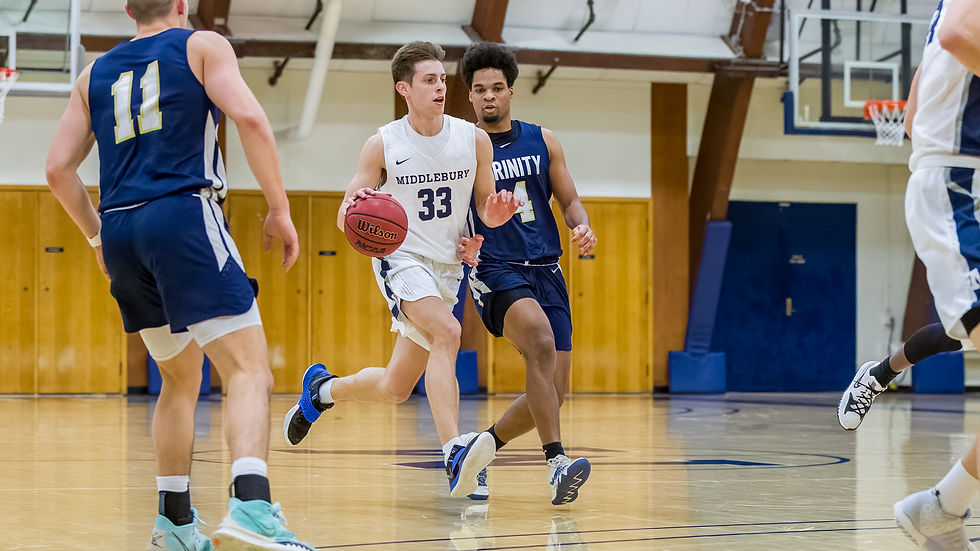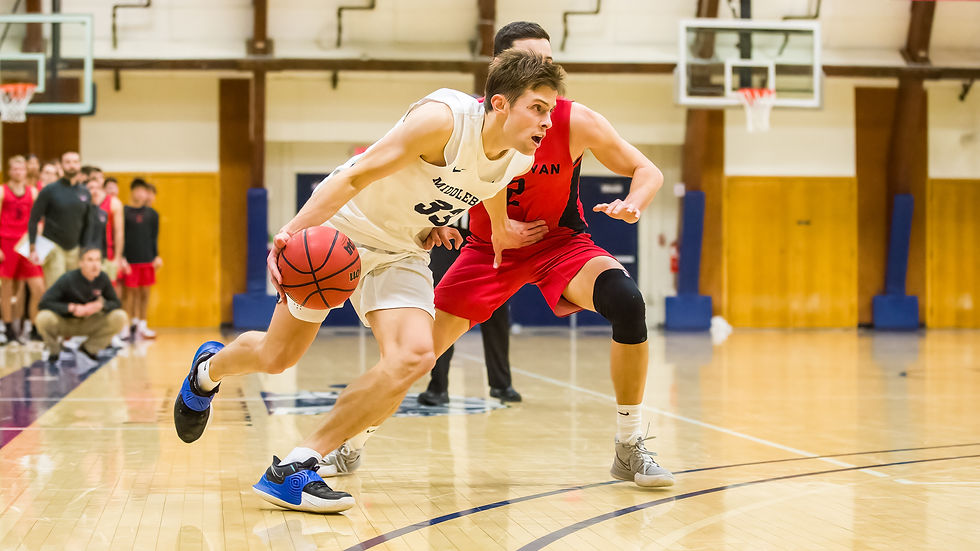Sam Stevens: Skinny Student To Middlebury Monster
- Josh Banner
- Sep 21, 2022
- 7 min read

Sam Stevens struggled.
He had some on-court skills, and pretty good athleticism, but he was usually younger and almost always skinnier than the guys he played against either in middle or high school in his hometown of Mansfield, Massachusetts.
“I can’t really remember one specific time because it happened so much,” he said. “It was normal to get pushed around by the bigger guys because I was just super, super small. I was their height, but it’s just like, there’s not much I can do.”
That's why there are a lot of JV teams on his resume and why his path to basketball success at Division III Middlebury is unusual. He's come to be a cornerstone for Middlebury coach Jeff Brown. Though baseball seemed a better bet for success, his heart always belonged to basketball and he was willing to do whatever needed to make his body eventually support his skills.
“Sam’s work ethic is really special,” Brown said. “He loves being in the gym working on his craft. He is always searching for ways to improve as a player.”
He's now one of the better players in the New England Small College Athletic Conference, and it didn't happen by accident.

Photos, including cover, by Will Costello
Growing Pains
Sam Stevens just could not sit still.
“He always has been a kid that needed to keep busy,” his mother, Karen Stevens said.
This was evident in his childhood. He played baseball, basketball, football, golf, and could get after it on the piano, too.
All the sports — and piano playing — caught up to him during his sophomore year, as he started experiencing back pain.
“I think it was just from being super skinny and just playing a lot of different sports,” he said.
He was also starting to sprout up and his body struggled to cope and resulted in significant injury.
“He was playing golf, baseball, and basketball at the same time in addition to going through a pretty decent growth spurt,” his father, Tom Stevens said. “I think the combination of those factors is what contributed to him having a stress fracture in his back.”
That meant that, for a period of months, Stevens wore a back brace and the once-active athlete had to pull back.
“[He] needed to stop doing activities,” Karen Stevens said. “And that’s probably the worst possible thing you can tell Sam.”
The back injury caused him to miss most of his sophomore basketball season and, at that point, he worried that it could mean the end of his basketball experience, even on the JV team.
“He was a little nervous that the coach was not going to necessarily let him back onto the [junior] varsity team when he was healed,” Karen Stevens said. “But, his coach at Mansfield really stuck by him and made sure that he held a spot for him.”
He sat with the team as he recovered and managed to return before the end of the year. But, he was still on the junior varsity ... and not even a guy who looked destined for serious varsity impact.
“No one really ever expected me to be the best player on the team,” he said.
With two years left in high school, time was running out to make basketball more than a hobby, but he finally got an opportunity to prove himself as a junior. Older and taller, he finally made varsity, though he was still skin and bones. Finally, his basketball output was starting to equal his baseball skills.
“I think it honestly got to a point where I was pretty average at both baseball and basketball,” Stevens said.
And so, it was decision time.
“It kind of just got to a point where I had to decide if I really wanted to be a good player – and at this point, I was just thinking about a good player on my varsity team at Mansfield,” he said.
“If I really wanted to be a good player, I kind of had to pick one and just go with it.”
The choice was easy: basketball.
“I thought it was a pretty easy decision for me to be honest because I was pretty done with baseball … I didn't have the same love for it that I found with basketball,” he said.
And that made the next task the one that was maybe high toughest of all. Sam had to get bigger or accept his fate as a marginal player.

Shifting Focus
Some dads take it easy on their kids while playing driveway basketball.
Not Tom Stevens.
“He was not necessarily happy with the physical advantages I had over him that would allow me to essentially score at will for a period of time,” Tom Stevens said. “He ended up getting remarkably frustrated with that over the years, but ultimately [he] ended up growing quite a bit, and those advantages completely diminished.”
Sam never took losing lightly and, even when he won, never seemed satisfied. The focus was always the same: What's next?
“Even if I go out and I have 25 points, it's always like, oh, I should have had 35,” Sam Stevens said. “I'm super hard on myself. So I think sometimes I don't really give myself as much credit as I maybe should.”
In a social-media driven environment, this can spark a negative outlook.
“Even if it's just seeing friends who are out somewhere and it's like, you either couldn't go with them or maybe you just didn't get the invite for that one thing,” Stevens said. “It's just like, sometimes it just sucks seeing people that always like to show their lives on social media as [if] it's always great. Everyone knows it's not.”
Stevens said he used social media as fuel.
“It's a tough time, especially now with social media,” he said. “Everyone's kind of constantly comparing themselves to everyone else. But when I did have those days, honestly, I would just go to the gym and basketball was really an escape for me. A good sweat always makes the day better.”
Sam began spending more time in the gym. It became a sort of sanctuary for him – an escape. He eventually started bulking up and jumped from 11 points and 5.5 rebounds per game in his junior year to 17.6 points and 6 rebounds as a senior. Those numbers caught the attention of college scouts, but he did not quite feel ready for college.
“[I] wanted to take another year to kind of just develop my game better to the point where I thought I could play at a high level of college basketball,” he said.
He spent the next year at Williston Northampton, a nearby prep school.
Although full of COVID restrictions, it was a perfect place to “bridge the gap” between high school and college, as well as prepare him for collegiate basketball.
“You just have a lot more access to facilities, to the courts, coaching, everything … there's a lot more time to develop, whereas public school I mean, I couldn't even really get into my gym after hours or outside of practice time,” Stevens said.
He described the prep school competition as “leagues above” his high school contests.
“Prep school, the guys are just so much bigger that it just helps [to play] against that level of talent,” he said.
Although the pandemic shortened the season, he still felt primed and ready to take the next step forward into the college game at Middlebury.

Making His Name At Middlebury
Stevens drive to constant improvement seemed a perfect fit for Middlebury.
“Quite honestly, there's not much to do outside of basketball and being outside and hanging out with people,” Stevens said. “I mean, there's distractions obviously because it's college but it being on a rural campus allows you to just put a lot of time into playing basketball and putting work into your academics.”
He has kept up his habit of spending most of his time trying to get better and it's worked out as he averaged 18 points and 5.9 rebounds per game as a freshman. He popped for a double-double in his first college game and a season-high 28 against Amherst.
“He lives in the gym,” former Middlebury assistant coach Connor Merrill said. “He’s in the gym every day working on his game, getting shots up before practice, after practice in the weight room. He’s really trying to be the best version of himself.”
His development has already led him to become a star in only his first year. He ranked third in the conference in points per game while leading his team in three-point shots. At the end of the season, he won the New England Small College Athletic Conference Rookie of the Year Award.
“He kind of stepped up as a leader as a freshman, which is pretty rare,” teammate Alex Sobel said.
He has come a long way since his time at junior varsity.
“Sam is the teammate that everyone wishes they could have,” Middlebury guard Jaden Bobbett said. “He pushes you, is a hard worker, makes shots at a high clip, never gives up, and always wants to win. I can't wait for the next three years we have together.”
In the rare instances where he is not at the gym, Sam Stevens’s heart is on display, becoming president of the school’s Special Olympics program and interning at A Shot For Life, a nonprofit that raises money for cancer research.
“He’s an extremely caring kid who … really feels a passion for giving back,” Tom Stevens said.
He also now eats well – a key piece to his development — and has seen the benefits of eating his share of chicken parms.
But for the most part, he spends time at his home – also known as the gym.
“I think it’s good to keep pushing myself to the limit, to see how much better I can be and how much I can improve day to day,” he said. “But, I think also sometimes I do need to recognize when what I've done is pretty good.”
If you enjoyed this article, please consider making a tax deductible donation. College Basketball Times is a 501 (c)(3) non-profit organization dedicated to equal coverage for all levels of college hoops - including D3. The operation of this site is made possible through your generous donations.
(Tax Deductible)

Comments